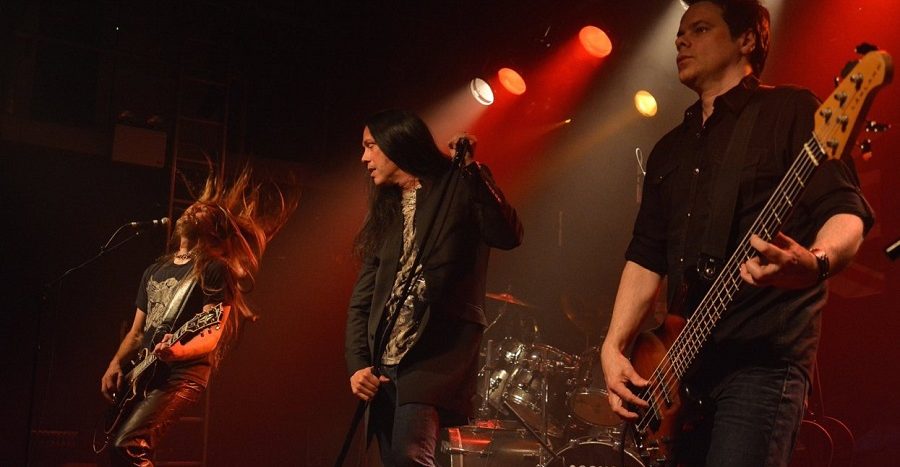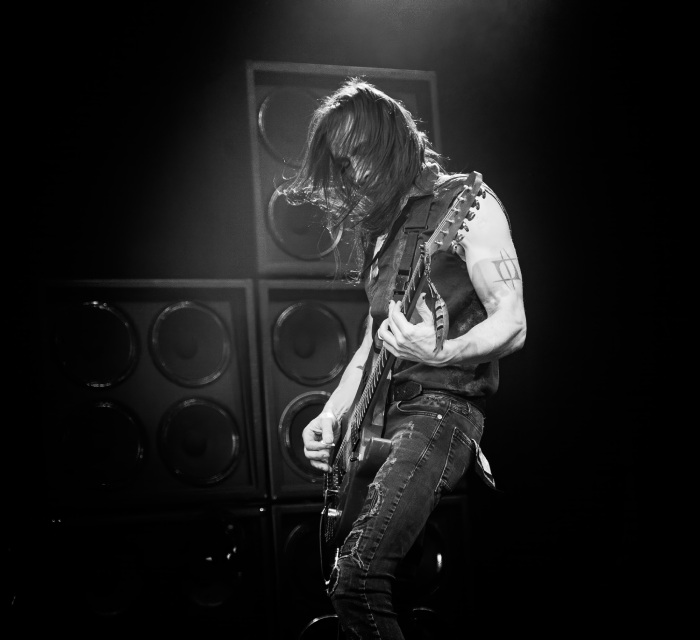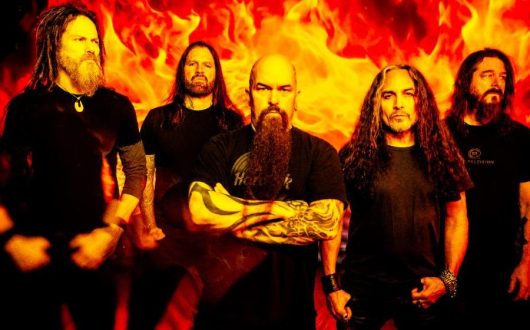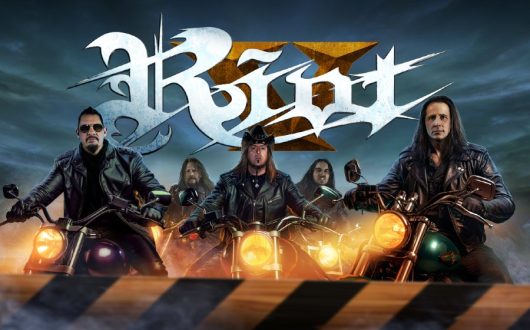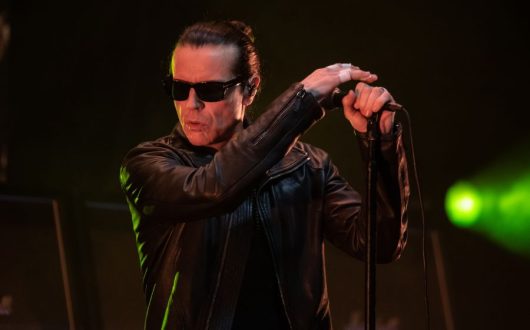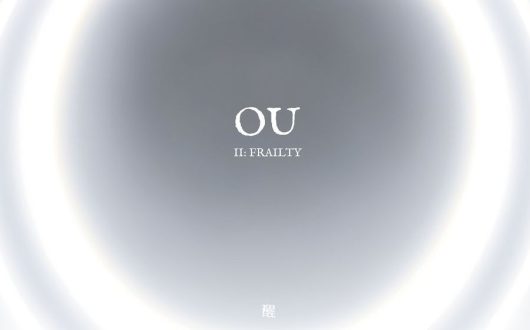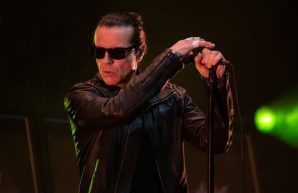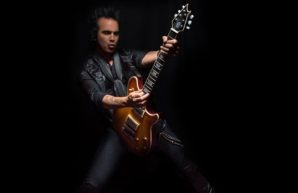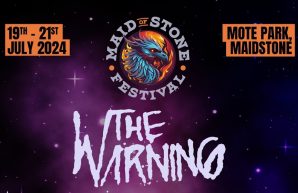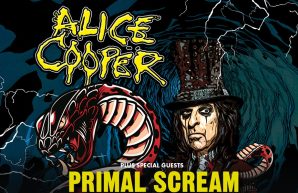Interview by Victoria Llewelyn
DANNY VAUGHN TALKS ALL THINGS TYKETTO, HIS CAREER IN THE MUSIC INDUSTRY AND THE UPCOMING TOUR WITH FM AND DARE.
Danny Vaughn, the voice of Tyketto and the producer of his diverse solo album projects, is getting ready to tour again with the band this May accompanied by DARE and FM on a triple headline bill in the UK. An exceptional talent when it comes to songwriting and musical creativity, Danny is one of those musicians you’d describe as a true artist. Unafraid to challenge musical boundaries and keen to connect warmly with his audience, there is a depth to Danny’s character and passion that isn’t often seen in those who have been around as long as he has.
MGM: Danny, you’re probably best known for bringing the power vocals to Tyketto in the 80s/90s, although they were not your first band – your career began way back in the early 80s singing with Waysted. Tyketto was a project you started out with on your own and took to the heights of success. What do you think made Tyketto special back then in a world where many bands of the same style and calibre were all clamouring for attention?
DV: Waysted was my big introduction to the world of rock and roll where I was invited to replace their singer at short notice. Back in 1987 when I put Tyketto together it was a decision I made, that rather than joining somebody else’s project again I would make something happen on my own, with the people around me – we’d all kind of come up together – so we found a place to live and work together, all of us. We were able to spend maybe five or six hours a day in the same building, writing, playing and practicing – it was very much a rock and roll boot-camp! Now you’d pay a lot of money to go do something like that! I believe that’s why the songs developed as cohesively as they did; because we had this intense, focused period to work in. Most bands can take years to work all this stuff out because of constraints on their time and as they’ll be playing live at the same time, but because it was so intense, we were able to produce these songs in a relatively short amount of time, and there was this constant feeling of being in motion around us, which seemed to get faster and faster the more focused we became.
MGM: The arrival of grunge is held responsible by many for killing off this particular era as you describe, and there are strong feelings about this even now from bands that were looking at the beginning of promising careers only to have their hopes dashed very suddenly and unexpectedly. Having been there through this period what’s your take on how this happened
DV: You know, there are still people out there to this day that say ‘I hate Nirvana. They killed all my favourite music’ – that’s not what happened. If you go back and look at all the music videos that were coming out between 1986 and 1989, and I know this because I was on them myself, it’s all Spandex, the enormous hair, all the guys in matching studded leather outfits throwing guitars around their necks. That was all very cool until everyone was doing it. We’d all seen David Coverdale’s girlfriend humping that car how many times? Then everybody got their girlfriends to do it. By the time ‘Nevermind’ came out it was the audience that decided what happened next. They’d had enough of the pretty guys and all that went with that, they looked at Kurt Cobain and thought ‘here’s a guy I can actually relate to. This guy’s accessible, he looks like us, he’s angry, he sings about stuff that we can understand. We’re going this way now’. You have to respect that.
I can tell you this honestly because Tyketto and Nirvana were on the same label – Geffen. When Geffen put ‘Nevermind’ out, they didn’t think it was going to smash everything, they wanted to try it out and see how the fans reacted, because Nirvana were doing quite well on their own. They had their own record, ‘Bleach’ which they were selling out of their cars and all the college students were following them. It was a gamble.
Music and the music business are two very different things. Record companies are stock experts, and the business is all fashion related, especially in America. A lot of industry success is down to luck, don’t kid yourself that they know what they’re doing! They are taking best guesses, sometimes it pays off and sometimes it fails miserably. It’s always a gamble.
MGM: Aside from the bands and the record companies, the media make up the third line of that triangle that completes the industry, how much of a role do you feel they had to play in this seismic change, and influence on bands and their fans at that time?
DV: I feel a tremendous enmity towards MTV, in my opinion it destroyed music. Everyone stopped wanting to pay for music for one thing, nobody pays for music anymore, they all want it for free. Also, it killed our attention spans – once you’ve seen your favourite band’s new video ten times it’s like – ok, now give me something else! It fostered this constant, potato-chip need of ‘gimme, gimme, gimme’. For us as musicians, MTV took all the fun away. It’s marketing, we get that, everyone’s in business to make money, but it went too far. We were having to churn out these videos that I hated, it killed my interpretation of the music. I had my own vision, which was a lot better than most of the tripe being put out at that time – oh, here comes the girl in the low-cut t-shirt, not sure what she has to do with the song but hey there she is anyway! It became a boxed in medium and had nowhere to go.
When I was growing up, if for example Led Zeppelin had done an interview it was such a big deal, you went out and you tracked it down and bought it because they didn’t do a thousand interviews. They might do one here and then months later another one there, it was special. The Stones were always fun, they always doubled back on theirs so they would tell one interviewer something, then say the opposite to another and then a different thing again to a third one. There was always something to talk about.
My good friend Kip Winger sums this up well – he says his entire career was killed by a cartoon on MTV. The Beavis and Butthead thing – the nerd kid wore a Winger t-shirt. Overnight they became irreparably damaged. If this had been a public forum with real people that would have been smacked down immediately, but because it was a cartoon, and they weren’t expressing real people’s opinions, they were allowed to rip into people like that. It damaged a lot of very talented musicians that had so much more good music to make. Suddenly no one would answer the phone to them – not these guys, can’t even poison a room with them!
DV: Firstly, I got into a pretty deep depression. It was soul crushing to watch this thing that I cared for and felt so strongly about get squeezed, smaller and smaller, to become so out of fashion that fans wouldn’t go to shows because they couldn’t tell their friends they were going to see a band like that. So, I walked away from it all. I left Tyketto in 1995 and I was done with the music industry, but I kept writing, for myself, and it was wonderful. I was able to write whatever I wanted, and I didn’t have to worry about whether it fit in to something or how it may go down with an audience. It was purely writing and exploring music. Then, around 2000, my drummer Mike Arbeeny with whom I have a deep, long-standing friendship gave me a call when I was up in his area, he came over to the house and saw my tiny little studio. I played him some stuff I’d been working on, and he said ‘we gotta make a record!’
A lot of stuff that has happened in my life has to do with Mike. Because Mike believed in me, the first solo album came about – ‘Soldiers and Sailors on Riverside’. That’s my answer to a lot of questions – because Mike believed in me. He’s still a very cool, close friend.
DV: It was very liberating because I didn’t have any goals. I would just put it out there, see if anyone liked it, took it out on tour and just had fun with it. I still love collaborating, but I was thinking – if I’ve got to make another Tyketto record it’s going to narrow things down for me and maybe I won’t have such a great time with it. There’ll be no bagpipes on a Tyketto record! With all my solo albums, including the most recent one ‘Myths, Legends and Lies’ I’ll be sitting at home thinking – no one’s gonna get this, this is too strange, these violin solos and all that – and once again the fans will prove me wrong. I need to listen more to the people that believe in me, and not the doubts inside my head!
I think Bowie once said something like – as an artist, if you’re not operating on that edge of uncomfortable then you’re not doing your best work. I’m paraphrasing, but I always thought that was beautiful, because Bowie knowingly did two or three albums that he said were his least favourite. It was his conscious decision – he knew at that point in time he could become the biggest act on the planet if he did a certain type of album, so he did. They’re great albums to listen to, but he felt they were creatively limited and not very inspiring. The point was that there was a purpose to them. I think of people like him, and Tom Waits for example, as true artists that I take inspiration from, they are going to challenge you and if you don’t like everything they do, they’re probably doing a great job!
MGM: The solo project appeared to take on a life of its own, as you describe, and also in the format of the Vaughnsday and Home Concerts. How did this concept come about, and do you think that these smaller, up close and personal shows are the way forward for musicians such as yourself now?
DV: We live in Spain, and when the COVID lockdown happened over here it was draconian. We had 47 days where you could not leave your home at all, unless it was for a medical emergency or to buy food, and even then, only one person was allowed out. This really started to hit home, and we weren’t sure how long we’d be in this situation for, it wasn’t as if someone was going to find the cure next week and everything would be good again. I badly needed to play, as a lot of us did, and whilst several artists were doing these 20 minute sets online with three or four songs, my Vaughnsday shows were over 2 hours long! For me it was therapy, and I’d have played if there were just three people watching. It kept me thinking, because in doing it every week I had to swap the songs around and really dig into my back catalogue, to relearn a lot of my own songs and figure out ways to arrange them for acoustic performance. Also, it became a really lovely way to connect with people. I was trying to keep myself from going crazy by doing this and it turned out that it helped so many other people also, people were saying how much they relied on it to get them through, and I never predicted that.
That was the springboard into the House Concerts where I’m now a much more confidant acoustic musician. Dan Reed got me into doing that too, because he’d been doing quite a few and the feedback was really positive. Some of them I’d do in clubs for maybe 40, 50 people, and then others would be in a room with just family, five or six people, and you’re still giving it your all. Initially, I was terrified, but now I realise I can do it and I’ve come away with some truly wonderful memories.
My friend Julie, who is a great help to me, she really calmed my anxieties about things not going so good and feeling exposed in that situation, she said – try to remember, people aren’t coming to these shows to experience perfection. They’re coming to feel something. And she’s right, without sounding egotistical the point is to bring joy to people. It’s not like – oh aren’t I wonderful? It’s more like, we’re doing this together, we’re creating something. You can’t do an acoustic show like this and be Paul Stanley. That’s for the arenas. You have to be a different person, more vulnerable, and more willing to fly without a net, and I’ve come to love it.
MGM: Next up for Tyketto will be the triple headline tour with FM and Dare, but prior to that you’re going on the Monsters of Rock Cruise. How is everyone feeling about coming back to these big shows?
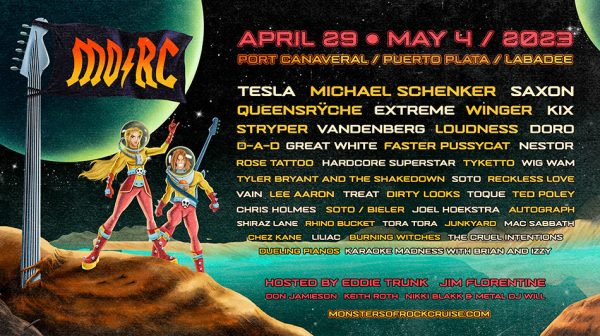
DV: The Monsters Of Rock Cruise is a very big deal as it’s the last performance with Michael Arbeeny and Chris Green, they are both moving on from the band to spend more time with their families. It was a decision that was put before everybody, there was no drama involved, they just said – we think it’s time. I was ready to fold up Tyketto’s tent altogether and put it all quietly to bed, and it was Michael, once again, who said to me – why would you do that? People will still want to hear you sing these songs, so go on and do it! So now we have the new guys coming in, Harry Scott Elliot on guitar and Jonny Dee on drums, and as soon as we hit land it’s straight off to the UK to start rehearsals with them, so there’ll be no time to dwell. Having said that, on the last note of that Monsters Cruise show it’s going to feel like Thor’s hammer has come down on my chest.
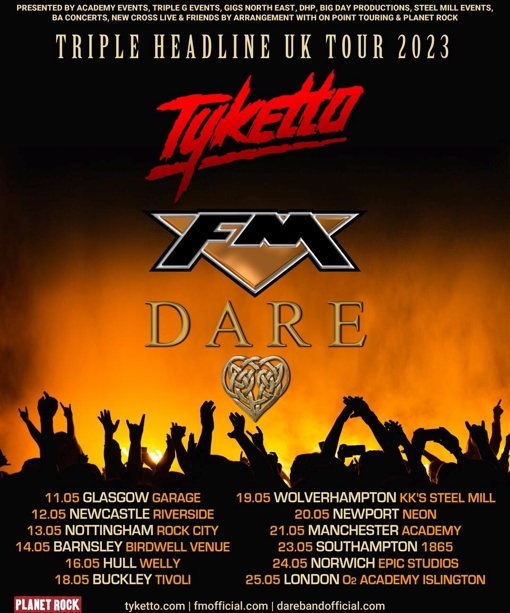
One cool thing about the shows with FM and DARE is that each show will be different in the order we play; we have twelve shows so there’s an equal distribution of position, but it’ll be top secret until the night! It’s been decided already as we all have our favourite venues that we want to be the headline at, and we all have an hour’s set. We knew, when we planned this tour out, that we really needed to do a package that would give more bang for your buck and really get people excited. A triple headline was the way to go, and we’re all pretty similar in what we do, I don’t anticipate any ego friction going on. Three hours of us I think should make people pretty happy! My attitude is that we just need to be great. We need people to walk out of there saying – God, Tyketto’s set was amazing! FM feel the same about their set, and Dare feel the same about theirs, so it’s a very happy competition.
Tickets for the UK Tour can be purchased HERE:
Tyketto, DARE and FM triple headline tour dates –
May 11th – Glasgow Garage, Glasgow
May 12th – Riverside, Newcastle Upon Tyne
May 13th – Rock City, Nottingham
May 14th – Birdwell Venue, Barnsley
May 16th – The Welly Club, Hull
May 18th – The Tivoli, Buckley
May 19th– KK’s Steel Mill, Wolverhampton
May 20th – Neon, Newport
May 21st – Academy 2, Manchester
May 23rd – 1865, Southampton
May 24th – Epic Studios, Norwich
May 25th – O2 Academy, Islington

